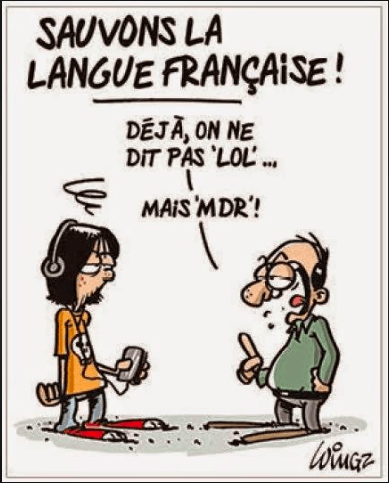These language lessons were probably not in your textbook.
Last summer, I hosted my teenage niece and her friends on their trip to Paris. Eleonor, who is studying French in high school back in the US, was eager to put her language skills to work. The questions she asked were very revealing. Although it’s been a while since I was in the classroom, Eleonor reminded me of what students are learning—and not learning—from their French teachers these days! Here are a few things that came up during their summer stay:
Pronunciation. At one point, a puzzled Eleonor asked me what “way” meant. I had no idea what she was talking about, but she insisted I used that French word all the time. I eventually realized she was referring to ouais, or how the French pronounce oui (yes) in casual conversation. It sounds less like “we” and more like “weh.” Think of it as the French equivalent to “yeah.” Ouais became their catchword for the visit, maybe because it’s more fun to say it that way.
Cursing. Somehow, curse words seem less aggressive in a foreign tongue. Understandably, high-school French teachers mostly avoid them. The worst I ever learned was zut alors, which you are as likely to hear as “golly gee.” I don’t recommend you try cursing up a blue streak, but you could store up some gritty words, for the pleasure of recognizing them when you overhear them. And you will hear them. The two most popular are merde and putain. The first is a rough equivalent of the English s**t while the second is more or less parallel to the F-word. While testing out your own swear-abilities, you can opt for the safer mince and purée. They are close enough in sound to the real thing but just different enough to keep it respectable. Think of them like our “sugar” and “fudge.” The French use them all the time.
Verlan. Only advanced learners get to the chapter on slang. It can be frustrating spending years studying French only to discover that there’s a whole other set of words out there that you’re more likely to hear. One popular form of slang is verlan. It’s a sort of Pig Latin, where syllables get flipped around to form cryptic words. In fact, the term verlan is verlan itself: the word for “backwards,” l’envers, well, backwards. Here’s an example: instead of merci, verlan gives you cimer. Likewise, métro becomes tromé, français céfran and so on… One of the most common verlan sayings is ouf, which is fou, or “crazy” backwards. C’est ouf! is an expression you’ll hear out of the mouth of a stunned French teen sooner or later.
Interjections and exclamations. “Yuck”, “yum” and “ouch!” The French equivalents are, respectively, beurk, miam and aïe! These outlaws of grammar often get overlooked in the classroom, but they can come in very handy. These pithy little utterances can stand on their own, and pack a punch. Can’t think of the verb tense you need fast enough? Instead of giving yourself away with the Anglo-Saxon “um…,” stall for time uttering the oh-so-French euh…

Texting Essentials. Some teachers might lament the use of texting lingo, but let’s face it: LOL is no longer just for teens. Want to use the latest in your own texts? The French use MDR, short for mort de rire, literally, “dying of laughter.” Other common shortcuts include PK for pourquoi (why), DSL for désolé (sorry), QQ1 for quelqu’un (someone), STP for s’il te plaît (please) and quoi 2 9 for quoi de neuf (what’s up?).





